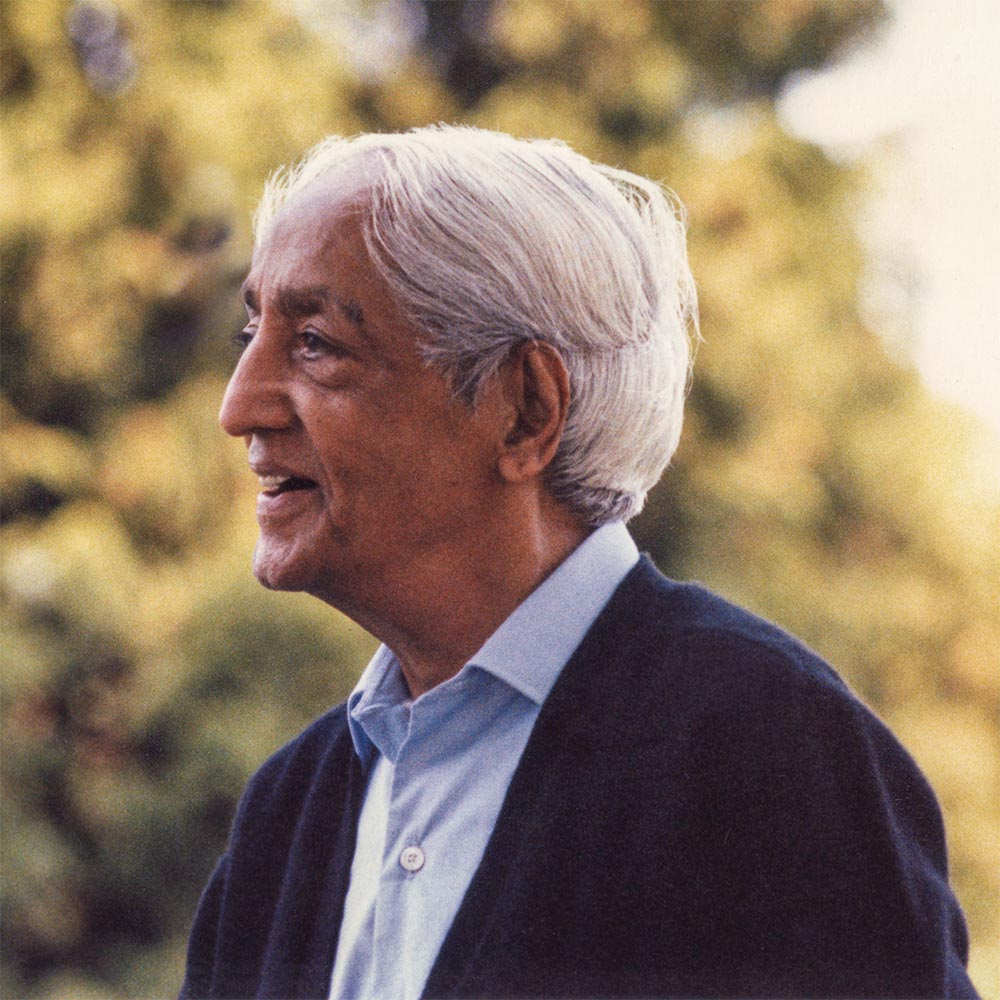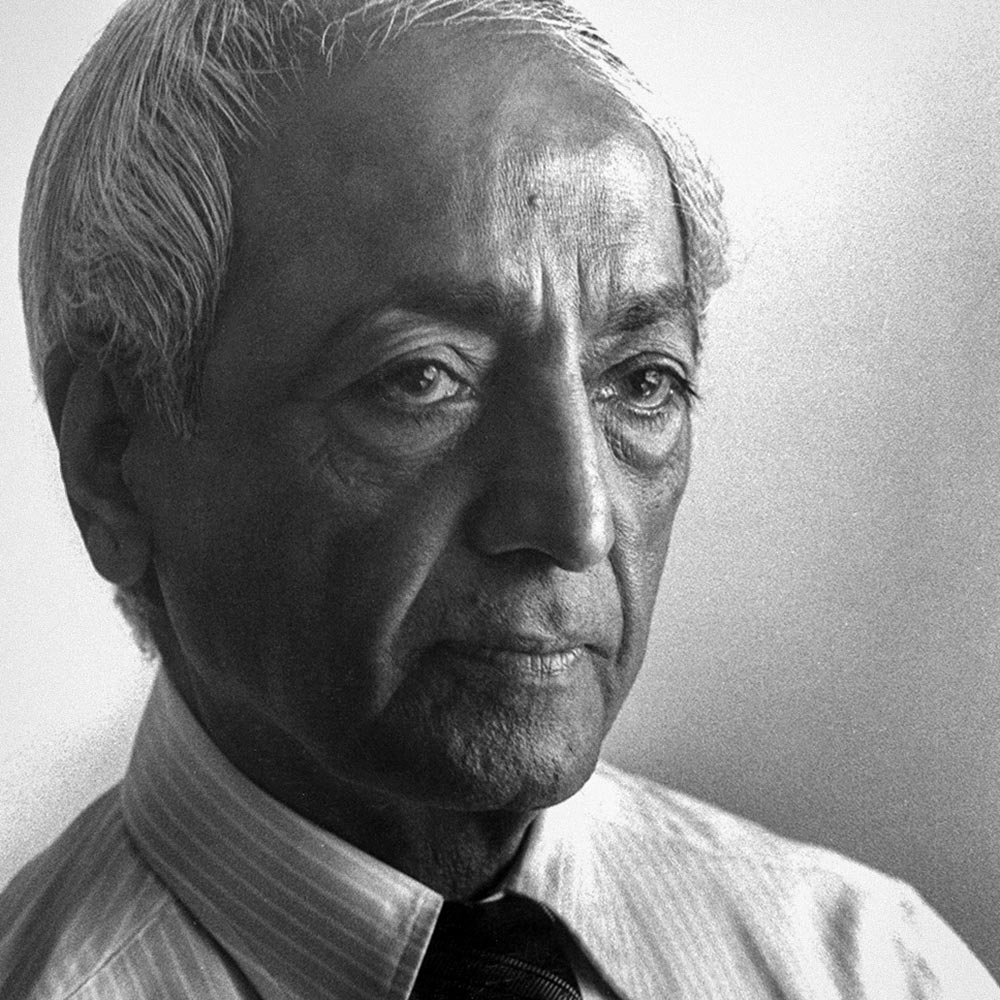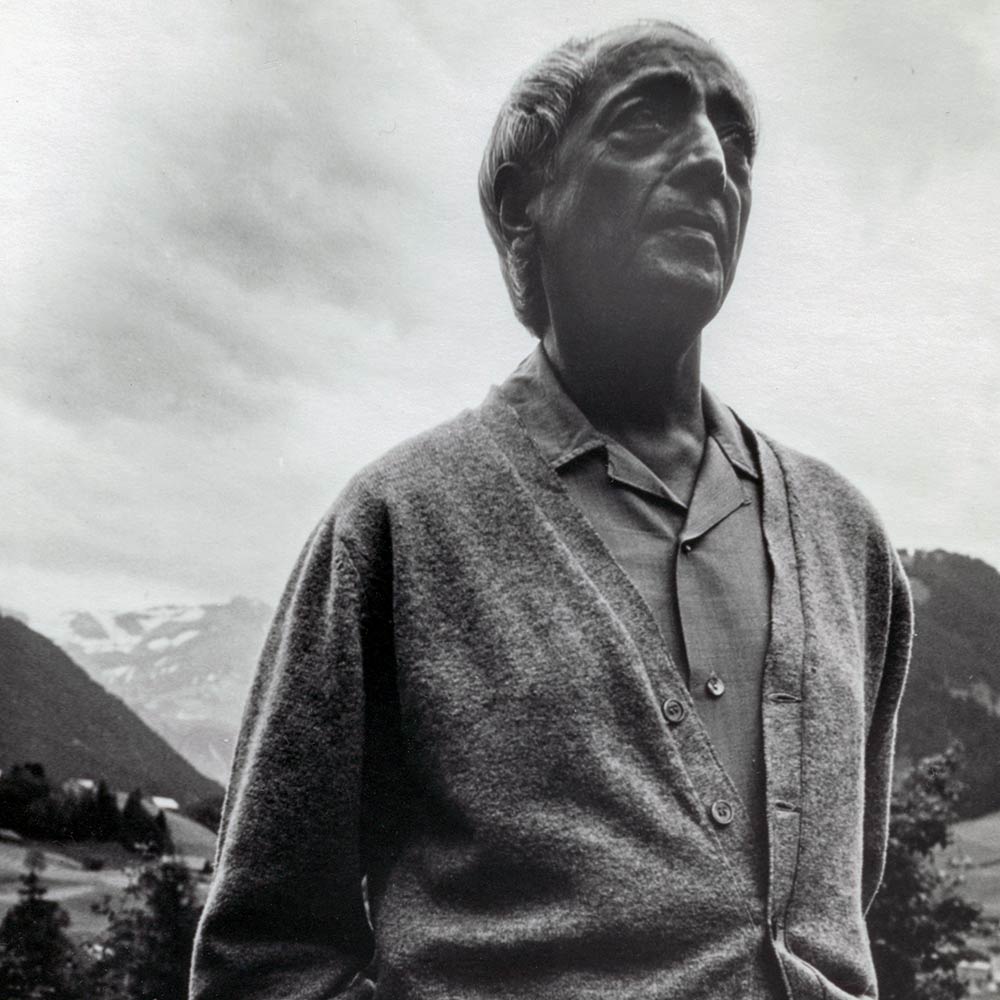Is there something within you which is so urgent that it burns away all contradiction?
Krishnamurti On Education
Read More
One is not alive. The question is to be totally alive, to be physically alive, to be in very good health, not to overeat, to be sensitive emotionally, to feel, to have a quality of sympathy, and to have a very good mind. Otherwise, one is dead. How would you awaken the mind as a whole? How would you see that you are completely alive inside and outside: in your feelings, in your taste, in everything? And how would you awaken this feeling of non-fragmented living? There are only two ways of doing it: either there is something within you which is so urgent that it burns away all contradiction; or you have to find an approach which will watch all the time, which will deliberately set about investigating everything you are doing, an awareness which will ceaselessly ask the question to find out in yourself so that a new quality comes into being which keeps all the dirt out. Now, which is it you are doing?
The urgency behind the right question, the very insistence of it, brings about perception.
Krishnamurti, To Be Human
Read More
One’s urgency to find the truth, one’s immediacy, one’s demand, puts the background in abeyance; one’s intensity to find out is so strong that the background ceases to interfere.
Krishnamurti, Reflections on the Self
Read More
There is no method by which to be free. The very urgency and importance of being able to learn will free the mind from conclusions, from the self.
Krishnamurti, Commentaries on Living 3
Read More
If, for me, the all-important thing is to understand you, this very sense of urgency overrides all my prejudices and opinions about you.
Krishnamurti, Commentaries on Living 3
Read More
We are not urgent or intense because we haven’t got the energy. To look at anything with all your being, with your eyes, ears, nerves, mind and heart, to look at it completely, requires energy.
Krishnamurti, The Awakening of Intelligence
Read More
If we are to understand ‘what is’, ideas must be put aside. Setting aside ideas becomes difficult only when there is no urgency in understanding what is.
Krishnamurti, Commentaries on Living 1
Read More
The inner demands greater diligence than the outer. It is an urgent demand. And this diligence is in the affectionate study of what one is.
Krishnamurti, The Whole Movement of Life Is Learning
Read More
The very change is urgency; it is not that change will come about through urgency.
Krishnamurti, The Impossible Question
Read More
What is missing in our lives is that complete action which has neither the past nor the shadow of the future. It is an action that is complete, immediate and urgent.
Krishnamurti, Meeting Life
Read More
As a tooth that causes intense pain must be attended to immediately, sorrow, if intense, demands urgent alleviation. But instead, we seek an escape or explain it away; we avoid the real issue, which is the self.
Krishnamurti, Reflections on the Self
Read More
We have to face things as they are, look at them very closely and see the urgency of doing something immediately, not leaving it to the scientist, politician or intellectual.
Krishnamurti, The Flame of Attention
Read More
It is necessary to be very serious, committed, urgent, not to any theory or ideology, but to find out for ourselves the cause of conflict.
Krishnamurti, Where Can Peace Be Found?
Read More
The problem of freedom and order is one of life’s most difficult and urgent problems, a very complex one.
Krishnamurti, On Education
Read More
As you turned a corner on the path, you came upon that complete silence, and as you entered the deep valley, it became more penetrating, more urgent, more insistent.
Krishnamurti, The Only Revolution
Read More
These quotes only touch on the many subjects Krishnamurti inquired into during his lifetime. His timeless and universal teachings can be explored using the Index of Topics where you will find texts, audio and video related on many themes. Another option is to browse our selection of curated articles or more short quotes. Krishnamurti’s reply when asked what lies at the heart of his teachings can be found here. Many Krishnamurti books are available, a selection of which can be explored here. To find out more about Krishnamurti’s life, please see our introduction and the biography. We also host a weekly podcast, and offer free downloads. Please visit our YouTube channel for hundreds of specially selected shorter clips. Below, you can learn more about Krishnamurti and our charity which he founded in 1968.

Who Was Krishnamurti?
J. Krishnamurti (1895-1986) is widely regarded as one of the greatest thinkers and religious teachers of all time. He spoke throughout the world to large audiences and to individuals, including writers, scientists, philosophers and educators, about the need for a radical change in mankind. Referring to himself, Krishnamurti said:
He is acting as a mirror for you to look into. That mirror is not an authority. It has no authority, it’s just a mirror. And when you see it clearly, understand what you see in that mirror, then throw it away, break it up.
Krishnamurti was concerned with all humanity and held no nationality or belief and belonged to no particular group or culture. In the latter part of his life, along with continuing to give public talks, he travelled mainly between the schools he had founded in India, Britain and the United States, which educate for the total understanding of man and the art of living. He stressed that only this profound understanding can create a new generation that will live in peace.
Krishnamurti reminded his listeners again and again that we are all human beings first and not Hindus, Muslims or Christians, that we are like the rest of humanity and are not different from one another. He asked that we tread lightly on this earth without destroying ourselves or the environment. He communicated to his listeners a deep sense of respect for nature. His teachings transcend man-made belief systems, nationalistic sentiment and sectarianism. At the same time, they give new meaning and direction to mankind’s search for truth. His teaching is timeless, universal and increasingly relevant to the modern age.
I am nobody. It is as simple as that. I am nobody. But what is important is who you are, what you are.
Krishnamurti
Krishnamurti spoke not as a guru but as a friend. His talks and discussions are based not on tradition-based knowledge but on his own insights into the human mind and his vision of the sacred, so he always communicated a sense of freshness and directness, although the essence of his message remained unchanged over the years. When Krishnamurti addressed large audiences, people felt that he was talking to each of them personally, addressing their own particular problem. In his private interviews, he was a compassionate teacher, listening attentively to those who came to him in sorrow, and encouraging them to heal themselves through their own understanding. Religious scholars found that his words threw new light on traditional concepts. Krishnamurti took on the challenge of modern scientists and psychologists and went with them step by step, discussing their theories and sometimes enabling them to discern the limitations of their theories.
Krishnamurti left a large body of literature in the form of public talks, writings, discussions with teachers and students, scientists, psychologists and religious figures, conversations with individuals, television and radio interviews, and letters. Many of these have been published as books, in over 60 languages, along with hundreds of audio and video recordings.

The Krishnamurti Foundation
Established in 1968 as a registered charity, and located at The Krishnamurti Centre, Krishnamurti Foundation Trust exists to preserve and make available Krishnamurti’s teachings.
The Foundation serves a global audience by providing worldwide free access to Krishnamurti videos, audio and texts to those who may be interested in pursuing an understanding of Krishnamurti’s work in their own lives.
In describing his intentions for the Foundations, Krishnamurti said:
The Foundations will see to it that these teachings are kept whole, are not distorted, are not made corrupt.

